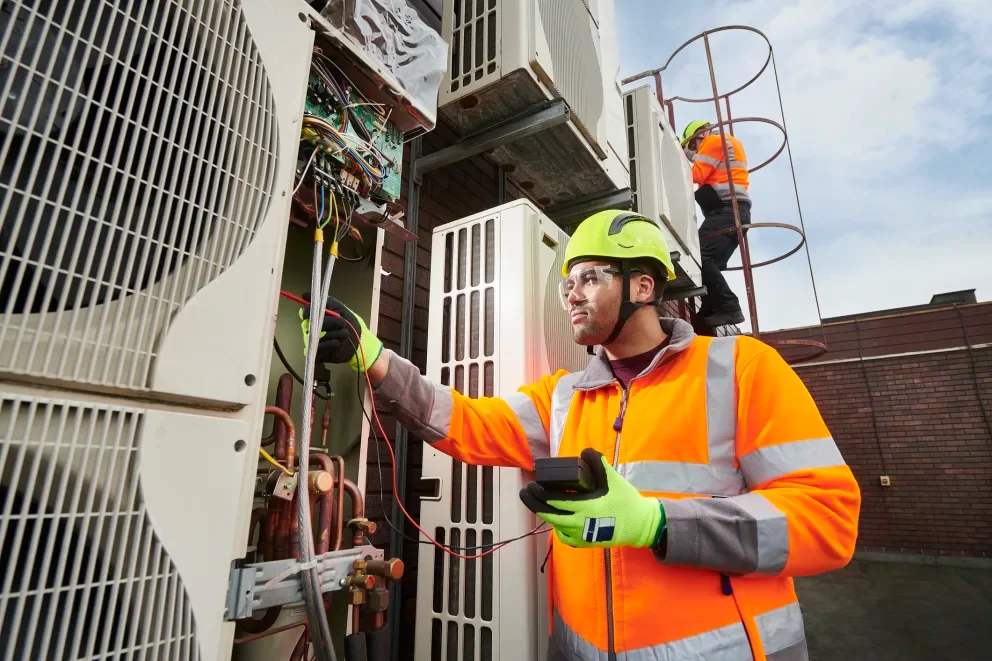An HVAC service contract is a binding agreement between a property owner and a service provider that outlines ongoing maintenance, repair services, and inspections for heating, ventilation, and air conditioning systems. These contracts are designed to ensure regular oversight of HVAC equipment, helping to keep the systems running efficiently and extending their longevity. Most contracts include scheduled check-ups, discounted repairs, and priority service calls.
Beside pre-defined schedules, an HVAC service contract often establishes emergency response protocols. This means if an HVAC system fails unexpectedly, the contracted company will provide expedited service to resolve the issue under agreed-upon terms. It’s particularly beneficial for avoiding long waits during peak season breakdowns. These contracts often offer financial predictability too, as they lay out the costs per visit or for a specified period.
Lastly, HVAC service contracts often encompass exclusions or limitations. It’s crucial for homeowners or facility managers to understand what is and isn’t covered. This might include conditions like refrigerant fills, parts replacements, or services for additional units. Clarity in contract specifics minimizes misunderstandings between the client and provider ensuring expectations are met for both parties.
Content:
- Increasing Business Comfort and Efficiency with an HVAC Service Contract
- Why Your Business Can’t Afford Not to Have an HVAC Service Contract
- The Crucial Role of HVAC Service Contracts in Business Performance
- Understanding the Impact of HVAC Service Contracts on Operational Efficiency
- The Hidden Benefits of HVAC Service Contracts for Businesses
In the labyrinth of homeownership responsibilities, the importance of an efficiently running HVAC system cannot be overstressed – it anchors the sustenance of home comfort. An HVAC service contract emerges as a proactive measure that sculpts peace of mind, while literally maintaining the climate within the home’s walls. This outlined choreography between homeowner and service provider redefines the conservational dynamics of modern dwellings.
Through seasons’ shift from the embrace of warmth to the caress of coolness, preemptive safeguards can avert the upheaval born from a stingy winter chill or an oppressive summer sun. The technical complexity of HVAC systems invites the necessity for expertise and precision. Service contracts promise consistent upkeep, ushering in periods of seamless transition while armoring homes against potential system failures.
When comfort and efficiency clasp hands, the result is a lived-in oasis fostered by reliable HVAC oversight. Venturing beyond mere transactions, HVAC service contracts cultivate a symbiotic relationship threaded with coverage specificities and economized engagements. The forthcoming discussion unravels how the implementation of a strategic HVAC service contract acts as a linchpin in home maintenance portfolios, enhancing occupants’ welfare with unfaltering vigilance.
Increasing Business Comfort and Efficiency with an HVAC Service Contract
Keeping a work environment at an optimal temperature is essential for comfort and efficiency. An HVAC service contract streamlines this process, providing regular checks and maintenance. By scheduling routine services, businesses can ensure their climate control systems work seamlessly year-round. This prevents disruptive breakdowns and the discomfort of unexpected temperature changes. Not only does a stable atmosphere enable better focus and productivity, but well-maintained systems also operate more efficiently.
Choosing a professional HVAC service contract brings tailored solutions for each business. Providers take into account specifics like building size and usage patterns, crafting a plan to suit these needs. This personalized approach makes sure that heating and cooling are delivered where it’s most required. Improved comfort directly correlates with staff satisfaction, as employees value a workspace that caters to their comfort. A dedicated HVAC service keeps the environment consistently pleasant.
An HVAC service contract often includes preventive care, which is crucial to avoiding costly emergencies. Technicians identify potential issues before they escalate, saving money and resources. Regular cleaning and replacement of filters also help maintain indoor air quality, benefiting the health of those within. Moreover, an efficient system reduces energy waste, cutting down utility bills. Therefore, the proactive nature of these contracts serves multiple financial benefits.
A common misconception is that HVAC service contracts are expensive and unnecessary. Contrarily, proactive maintenance can extend the lifespan of these systems, deferring the need for early replacements. In addition, many providers offer priority servicing to contract holders, which is indispensable during peak seasons. Having such support ensures that businesses won’t experience prolonged periods of system downtime, which can be debilitating.
In conclusion, an HVAC service contract is a valuable investment for any business seeking to enhance its operational efficiency. It assures a comfortable, healthful, and cost-effective work environment. By fostering better productivity, reliability, and energy savings, businesses are poised to thrive. A service contract works behind the scenes yet has a profound impact on the day-to-day experiences of staff and clients alike.
Why Your Business Can’t Afford Not to Have an HVAC Service Contract
Climate control is not merely a matter of comfort but a business necessity. Without a reliable HVAC service contract, companies face risks of system failures that can halt operations. Sudden malfunctions are not just inconvenient, they’re potentially costly, often requiring emergency repairs or even complete replacements. Such financial strains can be mitigated through the foresight provided by a service contract. Besides, the assurance of ongoing maintenance reduces the likelihood of unexpected expenses.
HVAC systems that are not regularly serviced can also drive up energy costs. Inefficient operations mean higher utility bills, which can stealthily eat into profit margins. An HVAC service contract assures regular checks and tune-ups, optimizing a system’s performance. This, in turn, results in more manageable and predictable energy expenses. Additionally, modern maintenance practices support eco-friendliness, aligning with sustainability goals many businesses now pursue.
The well-being of employees and customers is closely tied to indoor air quality, which is directly influenced by the state of HVAC systems. Dust, mold, and other contaminants can accumulate within poorly maintained systems, compromising health and potentially leading to increased sick days or customer complaints. Through regular HVAC maintenance, businesses can provide a safer, healthier atmosphere. Such initiatives reflect a commitment to corporate responsibility and can enhance a business’s reputation.
Operational disruptions from HVAC issues can befar-reaching. If a system fails during extreme weather conditions, the impact intensifies. Employee productivity can plummet, and customer foot traffic may drop. An HVAC service contract typically offers quicker response times and prevents long outages. This ensures business continues as usual, even when HVAC problems arise. Plus, contractors can tailor services to minimize business interruptions, aligning maintenance schedules with business hours.
In essence, it’s economically imprudent for businesses to neglect HVAC service contracts. The peace of mind these contracts offer is itself a valuable commodity, nurturing an environment where business can flourish unaffected by climate control concerns. A stable, maintained HVAC system underpins a productive business model, supporting continuity and growth. Thus, businesses cannot afford to overlook the security that a service contract provides.
The Crucial Role of HVAC Service Contracts in Business Performance
The performance of a business is often reflected in the subtleties of its operational activities, one being climate control. An HVAC service contract plays a crucial role in this arena, ensuring systems function properly to maintain productivity. Like a cog in a machine, HVAC systems need to run smoothly to keep the business engine performing optimally. A well-regulated environment facilitates efficiency in every task, from the front desk to the assembly line.
Diligent HVAC maintenance under a service agreement can anticipate problems that would otherwise derail business. This foresight proves invaluable, keeping the focus on core business activities rather than facility issues. Moreover, regular servicing can identify improvements or upgrades that enhance system performance. This proactive approach ensures that technology advancements are utilized, maintaining a competitive edge in operational efficiency.
For businesses operating across various seasons, the changing demands on heating and cooling equipment can be taxing. A service contract adjusts maintenance schedules accordingly, adapting to seasonal variations. The transition between these periods becomes seamless with such a plan, reducing the strain on HVAC systems. As a result, businesses are shielded from performance fluctuations caused by environmental changes inside the premises.
Furthermore, unexpected HVAC malfunctions can have a domino effect on a company’s infrastructure. Critical processes may depend on precise temperature controls, such as in server rooms or production facilities. An HVAC service contract introduces a layer of reliability, ensuring these critical spaces are consistently managed. Investing in this reliability translates into sustained business performance, avoiding potential setbacks due to temperature deviations.
Ultimately, an HVAC service contract is more than just a maintenance plan; it’s a strategic business tool. It upholds the performance of the physical aspects of a business, allowing leadership to concentrate on innovation and progress. High-performing HVAC systems underpin a stable and enabling work environment, propelling overall business performance. Companies that recognize the importance of such contracts often see significant returns in productivity and resilience.
Understanding the Impact of HVAC Service Contracts on Operational Efficiency
Operational efficiency is a cornerstone of successful business management, and HVAC systems play a supporting role in this aspect. Understanding the impact of having a service contract for these systems can reveal its profound influence on daily operations. An HVAC service contract ensures routine check-ups and adjustments, maximizing system efficiency. It allows these systems to operate in their best state, reducing the energy expenditure needed for heating or cooling.
Despite the initial cost, an HVAC service contract is a cost-effective decision in the long run. It transfers the burden of maintenance to professionals who ensure that all components are in optimal working order. Skilled technicians perform inspections and preventive maintenance, reducing the chances of abrupt failures. These actions not only prolong the system’s lifespan but also mean less downtime and associated expenses for businesses.
Even the most advanced HVAC systems require regular attention to maintain high performance. With evolving technology and environmental regulations, systems need to be up-to-date and compliant. A service contract often includes updates and modifications that keep pace with these changes. Thus, businesses stay aligned with industry standards and benefit from advancements in efficiency and sustainability without the hassle of continuous self-monitoring.
Notably, service contracts provide access to professional advice and experience. Technicians who regularly service HVAC systems understand them intimately and can offer insights on usage patterns and potential upgrades. This guidance can influence future investment decisions in infrastructure, optimizing the use of technology for enhanced productivity. SMEs can particularly benefit from such expertise, which might otherwise be unavailable or costly to them.
In recognition of these factors, businesses should consider HVAC service contracts as an investment in operational efficiency. It’s not simply maintenance—it’s a strategy for ensuring that every aspect of the business environment is conducive to success. By entrusting HVAC care to experts, firms can focus their resources on their core operations, secure in the knowledge that the ambient conditions of their premises are in capable hands.



